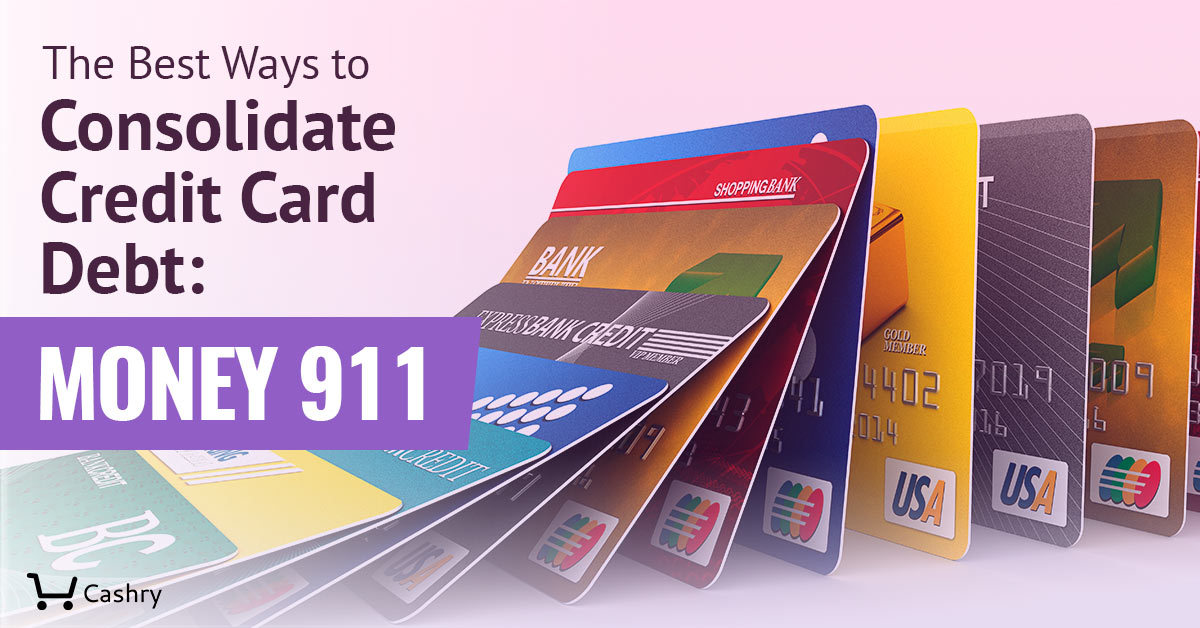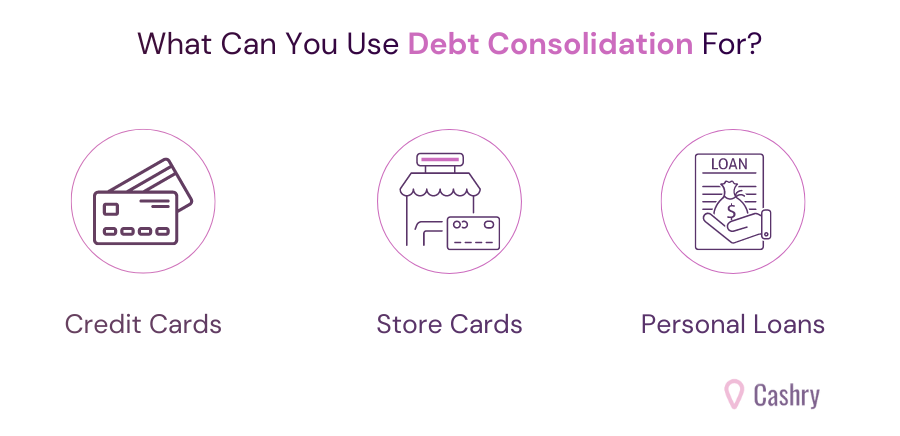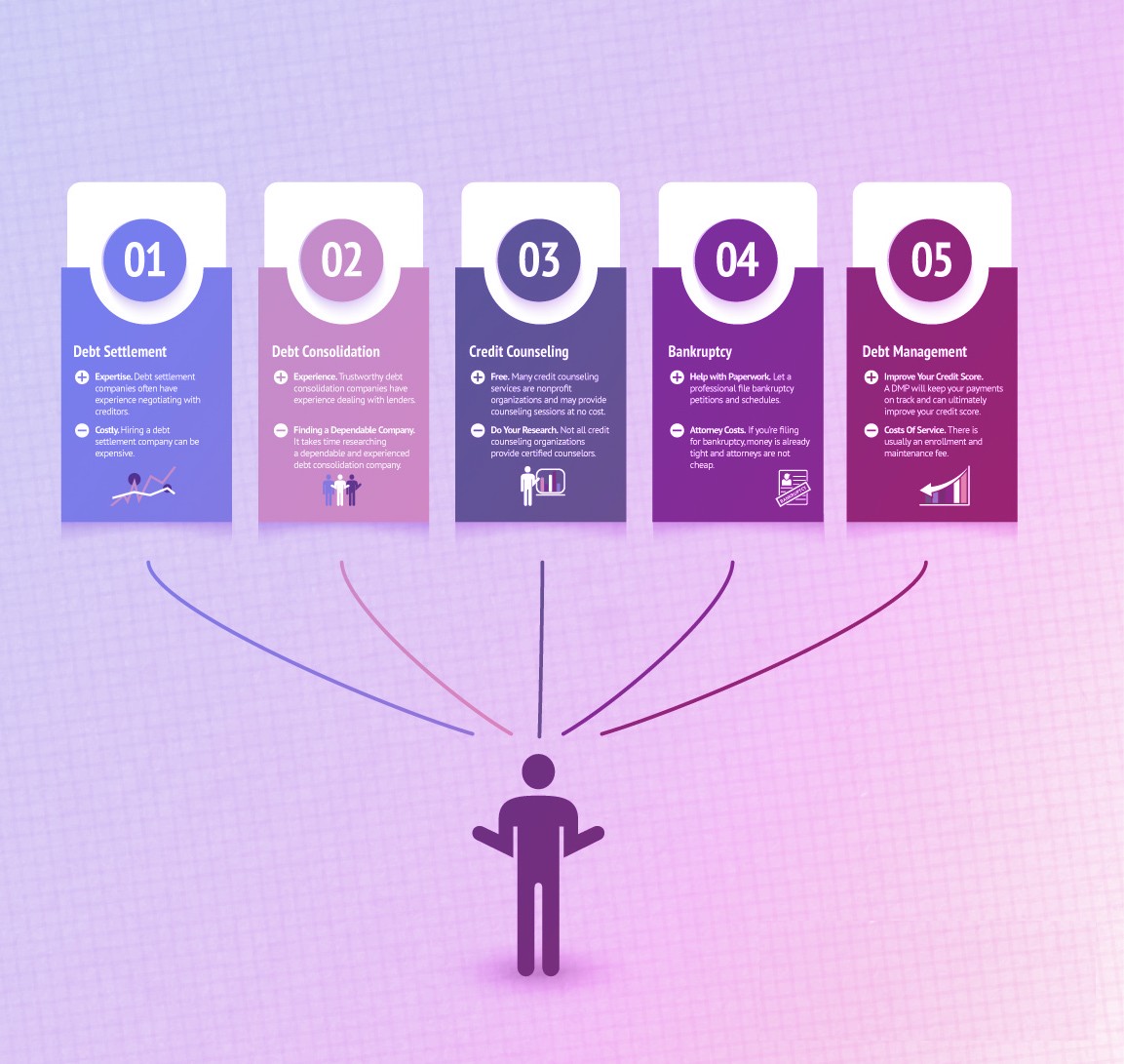The Best Ways to Consolidate Credit Card Debt: Money 911

When you first enter the world of credit, it may seem exciting to see tons of offers from various lenders. Things can get hectic for you if you’re not careful, however. You could end up paying on more than three credit card accounts, and each account could have a different payment date, payment amount, and interest rate. It might become difficult for you to juggle all of your cards, and you might feel like you’re overwhelmed after a while. The good news is that you can get out of the chaos fairly quickly if you use a credit card debt consolidation strategy. You can grab hold of your finances today if you understand the process and the options you have. Here is some information on consolidations and how you can consolidate credit card debt to get your life back on track.
What Is Credit Card Debt Consolidation?
If you want to consolidate credit card debt, you will first have to understand the meaning of a consolidation. The word “consolidate” means to combine. It’s as simple as that. Consolidating credit card debt means that you will go through a process to combine all the debt you have on your credit cards. You will choose from a variety of options and then use the method that gives you the most financial debt relief. Many benefits come when you merge all of your credit card accounts into one. You should consider it if you are showing the signs of someone who needs help.
Eight Ways You Can Consolidate Your Credit Cards
You can use a variety of strategies and strategy variations to consolidate credit card debt. Here, we are going to talk about the eight main ways to put all of your credit card debts into one account that you can pay on monthly. Your current financial situation and needs will determine which strategy is the best for you. We will explain each one in-depth and then weigh the pros and cons so that you can see them in front of you. After you’re done reading, you’ll know what’s best for you. You can talk to a provider about signing you up for the process after that.
1. Ask a Friend or Family Member for Help
Perhaps the most beneficial way to consolidate credit card debt is by going to a source that’s sort of “under the table”. You can try talking to your family members and close friends to see if you can get a loan from them for the amount that you need to pay off all your credit cards. Most family members and friends won’t charge you interest rates, and if they do, they won’t be as high as some of the lenders will charge you. Your loved ones are likely to give you a longer term to repay their advance, as well.
They’ll know you personally, and they will understand your struggle and your desire to get back ahead of the game with your finances. You should try this strategy first because it’s the easiest and the most convenient for you. The worst they can do is tell you no, but you might get a positive response instead.

Pros
- No banks or financial institutions
- Possible no-interest loan
- Cash in hands immediately

Cons
- Family members may not have available funds
- Money can always be a dangerous topic to introduce into relationships
2. Apply for a Debt Consolidation Loan
You can try various lenders if you can’t go to your family or friends for the help you need. Consolidation loans are available through traditional banks, credit unions, and other financial institutions. You can even go to a reliable company that will take your information and help you look for a loan that suits your needs. Financial advocates are there to find you a loan that fits your lifestyle, income, and needs perfectly.
You may need to polish up your credit report before you can qualify for a consolidation loan. Therefore, you should order a copy of it and straighten out anything negative or suspicious. Dispute charges that you do not believe should be on your report. Try to have some of your inquiries removed if you don’t remember making them. Pay down some of your debt if you have accounts with small balances that you can knock out yourself. You’ll see a rise in your credit score the moment something comes off of the report. The higher your credit score is, the lower the interest rate you can qualify for when you apply for a consolidation loan.

The way a consolidation loan works is very simple. A lender approves your request for an advance in the amount that you need to pay off your debts. You pay all of your credit card debts in full. You then repay the consolidation loan lender every month with one simple payment. Oftentimes, consolidation loans offer interest rates that are only fractions of what the original credit card accounts had. You can cut your costs significantly if you can obtain a consolidation loan that has a low interest rate. It might be the smartest move you can make.

Pros
- Low interest rates
- Quick approval
- Credit cards are paid instantly

Cons
- Must have good credit
- The application will cause a credit inquiry
- Credit score may drop at first
3. Take a Loan From Your Retirement Account
Another way that you can consolidate credit card debt is by taking a loan from your retirement account. Many financial companies allow their clients to take loans against their retirement funds. That might work for you if you have a 401K account through your employer. You will have to pay the money back, but the money will come from your paycheck in small increments over an extended period. The interest rates are generally low for 401K loans, as well.
The 401K loan is one of the wisest ways you can consolidate your credit card debt. That’s because you’re borrowing from yourself and paying yourself back. You’ll still have money when you retire, and you will have paid off your overwhelming credit card debts, as well. Retirement account loans usually don’t have long wait times for approval. You may receive an answer to your request in only a few weeks.

Pros
- No credit check
- Low interest rate
- Repayments come from paycheck

Cons
- You must have a certain amount in your 401k before you can borrow money
4. Request a Personal Loan
You might not qualify for a consolidation loan, but you may be eligible for a regular personal loan. The choice of lending sources is enormous. Therefore, it might be best for you to contact an agent who can help you find the right loan rather than going it alone. This agent will have access to a database of lenders of whom you may have never heard. One of them might be willing to work with you and help you pay off your credit cards.

Pros
- Variety of lender options
- Quick approval

Cons
- Credit checks and inquiries added to your report.
5. Get a Home Equity Loan
Your home, if you own one, is one of the greatest assets you have. You can use its equity to qualify for many products, including a home equity loan. Using the funds from the equity in your home to pay off your credit cards is another solution. You will pay the lender back in monthly installments, as well.

Pros
- Quick process
- Lower interest rates
- You might qualify for more than you need

Cons
- You could lose your home if you default on the loan
- You will no longer be able to use your home as a security if you need to apply for some other loan
6. Do a Cash-Out Auto Refinance
You can also use the equity in your vehicle to obtain the money that you can use to repay your credit card debt. Contact a financial service provider who can research the options available to you for cash-out auto refinancing. You might be surprised about the number of lenders that are willing to help you.

Pros
- Quick turnaround time
- You can qualify for more than you owe on your cards

Cons
- The lender could take your vehicle if you default on the advance
7. Put It On a Balance Transfer Card
You could also apply for a balance transfer card and use that card to transfer the balances of all your credit cards. This is where having all of your account balances and information comes in handy. You’ll need to request a balance transfer card with a limit that matches what you need to pay off debts. You may qualify for an additional credit line, and you may not.
The qualifications for a balance transfer card are about the same for any other credit card. You have to have a good credit score, so you need to apply while your credit is still intact. You must be 18 years of age and mentally competent to sign a contract, as well.

Pros
- Lower interest rate
- May qualify for additional credit line
- Pay off existing credit cards

Cons
- You may not qualify
8. Sign Up for a Debt Management Plan
Another way that you can consolidate credit card debt is by signing up for a debt management plan. A debt management plan can help you to clean up your entire financial profile and not just your credit cards. The DMP is a good idea because it does not involve any loans. You won’t have to deal with a lowered credit score, and you won’t have to pay another company every month. Debt assistance companies work with consumers to combine all of their accounts into one monthly payment. They provide a variety of other services, as well.
Some of them may negotiate with your current lenders to try to get your balances down so that you can afford them. Others will provide educational tools so that you can learn how to save money and use the credit that you have wisely. Some providers might help you understand your credit report and all the intricate parts it has. It depends on which company you work with. The best strategy is to go with a company that has a long history and many positive reviews from consumers who have worked with them.
But, How Is a Debt Management Plan Working?
The way a debt management plan works is simple. Your counselor or agent will order a copy of your credit report and ask you some questions about your current income, spending habits, debts, and so forth. This individual will then contact your creditors if they provide that service. They will work with the creditors to get your debts down as low as possible. Then, they will help you develop a monthly payment plan that you can afford. You will then pay that amount every month plus any fees that the provider charges for the services. Your account manager will make sure that all of your accounts get paid each month with the money you give them. Debt management plans generally last about five years. You’ll see a significant change in your credit score as you pay down your debt.
You can get started on a debt management plan as early as today if you truly have the desire to make things better in your life. You can call for a consultation and find out the services that are available for you, aside from the debt management plan.

Pros
- No loans
- Quick results
- No hassles

Cons
- Must trust a third-party person to take care of your finances
- There may be fees involved
How Can You Tell if You Need to Consolidate?
There are many signs that you might need to consolidate credit card debt. One indication is that you have trouble remembering all the dates you have to make your payments. Perhaps you missed a payment before, or you almost did because you couldn’t remember which card was due at what time. Another sign is that you find yourself paying a lot of interest and not much of what’s owed on the principle. That’s a sign that your interest rates might be extremely high on some of your cards. Another sign is that your credit score goes down because you have a myriad of open accounts. It’s good to have some open accounts, but too many various accounts can be harmful, especially if a lot of them are new. It may be time for you to consolidate credit card debt if you notice any of the signs mentioned above.
Who Qualifies for Credit Card Debt Consolidation?
Just about anyone can qualify for credit card debt consolidation. You need to be 18 years of age or older, but you’re probably of age if you have credit cards in your name. The type of consolidation you choose will determine your unique set of qualification criteria. You may have to have a good credit score for certain types of solutions. Other solutions are attainable just by being a debtor who has several credit cards.
The Benefits of Consolidating Credit Card Debt
As previously mentioned, you will reap many benefits if you decide to consolidate credit card debt. Peace of mind is the first benefit you’ll get from the process. You will no longer have to remember scattered payment dates and amounts. You will also save money if you use the consolidation as a debt reduction strategy.
Some consolidation processes allow you to lower your interest rates, which can save you thousands of dollars on your debt. Additionally, you will be able to pay your debt off faster, which will cause your credit score to rise. A consolidation can organize your finances and polish your profile so that you can get the things you need and desire later in your life.

How to Prepare for Credit Card Debt Consolidation
You will have to prepare yourself before you venture into the world or credit card debt consolidation. The first thing you need to do is stop spending. You should take a break from racking up any more expenses on your credit cards until you can conduct your consolidation. The next thing you need to do is add up all of your balances so that you’ll know how much money you need to cover. Once you do those two things, you’ll be ready to consolidate credit card debt in no time.
Final Thoughts
Now that you know everything there is to know about ways to consolidate credit card debt, you can get started on finding a strategy that’s right for you. Always remember that applying for a loan must only be done if you are sure you will be able to repay it on time! If you have any doubt, you should go with another solution.
We specialize in helping people finding the financial tools and products they need. We are here for you whether you need a loan to consolidate credit card debt, or you need some tips on how to consolidate credit card debt.
You can trust us with your information and your desires because we will work for you. We are your financial advocates, and we are not partial to a particular lender, nor lending any money. We help consumers find loans and other products based on their unique situations and needs. Don’t wait another moment to get started if you want to consolidate credit card debt. Contact us now and speak with one of our caring advocates. It might be the best decision you’ve made in a long time!


Timiarah Spriggs is a personal finance writer who specializes in credit score growth and smart budgeting. She share budgeting, saving, and financial planning advice with various renowned finance shows, podcasts, and finance sites. Timiarah discovered the world of personal finance out of necessity. Her passion lies in helping consumers stay afloat in the world of finance and become masters of their profiles.

